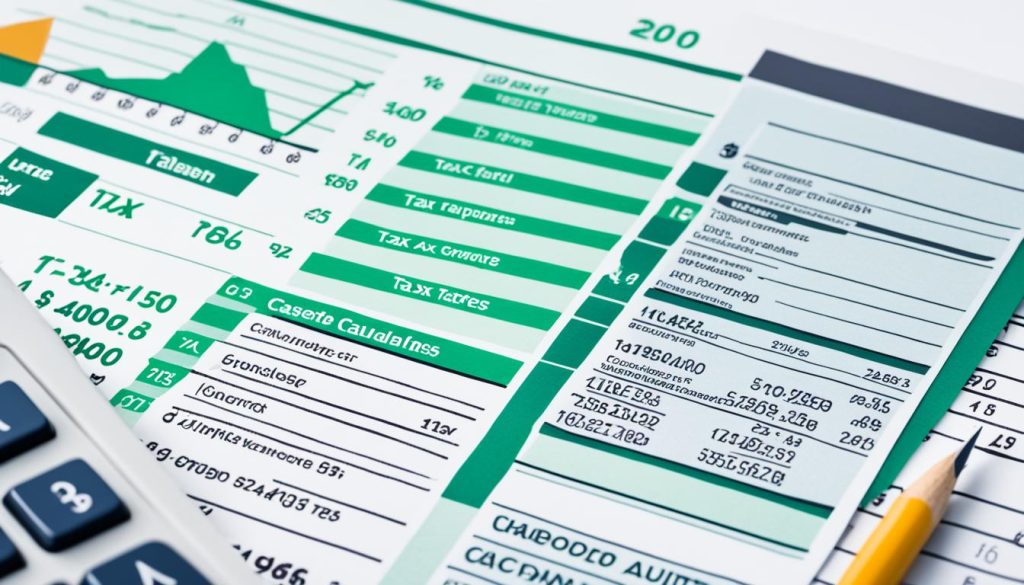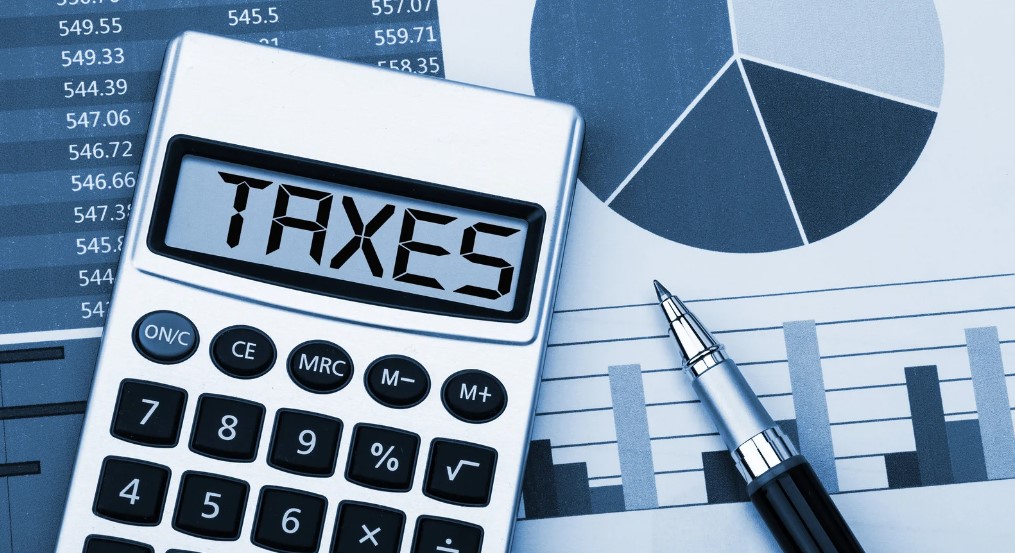Are you starting a new business in the UK and wondering how tax is calculated? Understanding the tax calculation process is crucial to ensure accurate reporting and timely payment. In this article, we will explore the various tax calculation methods and guidelines in the UK, providing you with the information you need to navigate the tax landscape successfully.
Calculating tax for a new business involves comprehending different types of taxes and how they are computed. Income tax, corporation tax, and self-employment tax are key considerations. The calculation process depends on factors such as the business structure, profit levels, and the method of payment to the owner.
In the UK, it’s essential to be aware of the specific rules and guidelines set by HMRC (Her Majesty’s Revenue and Customs) for accurate tax calculation and timely payment. This knowledge ensures compliance and helps you avoid penalties or legal issues along the way.
In the following sections, we will delve into the intricacies of income tax, corporation tax, self-employment tax, as well as other business taxes in the UK. Understanding how each tax is calculated and the corresponding rules and regulations will empower you to make informed financial decisions for your new business.
Understanding Income Tax Calculation in the UK
Income tax calculation in the UK is crucial for both individuals and businesses. It is essential to comprehend the rules and guidelines set by HMRC to accurately determine tax liabilities. In this section, we delve into the process of calculating income tax, exploring the various factors that influence the rates and methods.
Personal Income Tax Calculation
For individuals, income tax is calculated based on their profits that exceed the personal allowance. The personal allowance is the earnings threshold below which no tax is payable. Different tax bands apply to different levels of taxable income. These bands include:
- Personal Allowance: Up to a certain threshold, no income tax is paid.
- Basic Rate: The income falls within this band once personal allowance is exceeded.
- Higher Rate: The income exceeds the basic rate threshold but is still within this band.
- Additional Rate: The income surpasses the higher rate band.
Understanding the taxable income and applicable tax rates is crucial for accurate income tax calculation. HMRC provides detailed resources to assist individuals in understanding the thresholds and calculating their tax liabilities.
Employment Income Tax Calculation
Businesses need to calculate income tax for their employees using the PAYE (Pay As You Earn) system. The PAYE system takes into account the employee’s salary and personal allowances. Employers deduct income tax from the employee’s salary and pay it to HMRC on their behalf. It is essential for employers to have a thorough understanding of the PAYE system and correctly calculate the income tax deductions for their employees.
Use the UK Tax Estimator Tool
HMRC provides an online tax estimator tool to help both individuals and businesses estimate their income tax liabilities. This tool takes into account various factors, such as income, allowances, and deductions, to provide an estimate of the tax payable. Utilizing this tool can assist in planning and budgeting for tax obligations.
By understanding the income tax calculation process and utilizing the resources provided by HMRC, individuals and businesses can ensure accurate tax calculations and meet their tax obligations effectively.
How is Corporation Tax Calculated in the UK?
Corporation tax is a key component of the tax system in the UK and is applicable to limited companies and certain other types of organizations. Understanding how corporation tax is calculated is essential for businesses to accurately assess their tax liabilities and fulfill their tax obligations.
Calculation of corporation tax is based on the profits generated by the business during its financial year. This includes profits from trading activities, investments, and sales of assets. The rate of corporation tax is determined by the size of profits, with different rates applied to small profits and larger profits.
Marginal Relief may be available to businesses, which can help reduce the effective tax rate for profits falling between certain thresholds. This relief is provided to support smaller businesses and incentivize growth.
To calculate corporation tax, businesses need to register for the tax and maintain accurate accounting records. It is important to keep track of all income, expenses, and financial transactions throughout the financial year to ensure the accuracy of the tax calculation process.
Once the corporation tax liability has been determined, businesses are required to pay the tax within the designated deadline. Failure to meet this deadline may result in penalties and fines.
The UK government provides guidelines and resources to assist businesses in calculating their corporation tax liabilities. These resources help ensure that businesses are aware of the latest rules, regulations, and compliance requirements.
| Key Factors in Corporation Tax Calculation | Calculation Process |
|---|---|
| Profits from trading activities, investments, and asset sales | Determine the total profits made during the financial year |
| Rate differentiation based on profit size | Apply the relevant corporation tax rates based on profit thresholds |
| Marginal Relief | If eligible, apply Marginal Relief to reduce the effective tax rate |
| Registration and record-keeping | Register for corporation tax and maintain accurate accounting records |
| Tax payment | Pay the corporation tax within the designated deadline |
Calculating corporation tax can be a complex task, and seeking the guidance of a professional accountant or tax advisor can provide valuable assistance in ensuring accurate tax calculation and compliance with tax laws.

The Calculation Process for Self-Employment Tax in the UK
Self-employment tax calculation in the UK requires self-employed individuals to take on the responsibility of assessing and paying their own taxes. The tax amount is determined based on the trading profits generated by the business. To accurately calculate their tax liability, self-employed individuals must complete a self-assessment tax return. This process involves registering with HMRC, keeping track of income and expenses, and fulfilling the tax assessment requirements.
Registering with HMRC is an essential step for self-employed individuals to ensure compliance with tax obligations. This enables HMRC to provide relevant guidance and communicate important updates and deadlines. It is important to note that failing to register or meet the necessary requirements can result in penalties and legal consequences.
Accurate income and expense tracking play a crucial role in calculating self-employment tax liability. Self-employed individuals must keep detailed records of their business income, including sales, invoices, and any other revenue streams. Additionally, keeping a record of business-related expenses such as office supplies, equipment, and travel expenses is vital. By analyzing these records, self-employed individuals can determine their taxable profits.
The tax assessment process involves completing the self-assessment tax return and submitting it to HMRC by the designated deadline. This tax return includes detailed information about the individual’s self-employment income and expenses. Self-employed individuals can also claim relevant tax deductions and allowances to minimize their tax liability.
Important points in the self-employment tax calculation process:
- Registered as a self-employed individual with HMRC.
- Maintain accurate records of business income and expenses.
- Calculate taxable profits.
- Claim applicable tax deductions and allowances.
- Complete the self-assessment tax return accurately and submit it on time.
- Make the necessary tax payments by the specified deadline.
It is essential for self-employed individuals to understand the rules and guidelines set by HMRC to ensure compliance and accurate self-employment tax calculation. Seeking professional advice from accountants or tax experts can provide valuable insights and support throughout the process.

By following the proper self-employment tax calculation process, self-employed individuals can meet their tax obligations effectively and avoid unnecessary penalties. Understanding the calculation process and staying informed about the latest tax regulations help ensure a smooth tax assessment and payment experience.
Other Business Taxes in the UK
In addition to income tax and corporation tax, there are several other business taxes in the UK that businesses need to be aware of.
National Insurance contributions
National Insurance contributions are applicable to both self-employed individuals and businesses with employees. These contributions fund various state benefits, including the State Pension and allowances for unemployment and sickness. The amount of National Insurance contributions depends on the employee’s earnings and the class of National Insurance they belong to. For self-employed individuals, the contributions are calculated based on their annual profits.
Value Added Tax (VAT)
Value Added Tax, commonly known as VAT, is a consumption tax charged on most goods and services provided by VAT-registered businesses. The standard VAT rate in the UK is 20%, but there are also reduced rates of 5% and 0% for certain goods and services. VAT-registered businesses are required to keep records of their sales and purchases, file regular VAT returns, and pay any VAT owed to HMRC.
Business Rates
Business rates, also known as non-domestic rates, are taxes paid on business properties to local councils. The amount of business rates payable depends on the rental value and the location of the property. The local council sets the rates, and businesses should take this into account when budgeting for their premises’ costs.
Dividends Tax
Dividends tax is applicable to shareholders receiving dividends from a company. The tax rate depends on the individual’s income tax band, and there is a tax-free allowance for dividend income. Shareholders should report their dividend income on their annual self-assessment tax return and pay any tax owed to HMRC.
Capital Gains Tax
Capital gains tax is paid on the profit made from selling assets, such as property or shares, that have increased in value. The tax is calculated based on the capital gains made during the tax year, after deducting any allowable losses and applying exemptions and reliefs. The rates of capital gains tax depend on the individual’s income tax band.

Each of these taxes has its own calculation methods and rules, and businesses should ensure they understand and comply with the tax obligations for each. Consulting a professional tax advisor or accountant can help businesses navigate the complexities of these taxes and ensure accurate calculations and timely payments.
Conclusion
Calculating tax in the UK for a new business requires a thorough understanding of the various taxes and their calculation methods. Staying updated with the latest tax rates and guidelines provided by HMRC is crucial to ensure accurate tax calculation. Seeking professional advice from accountants or tax experts can provide valuable insights and ensure compliance with tax laws.
One essential aspect of accurate tax calculation is keeping accurate records of income and expenses. Maintaining organized and detailed financial records enables businesses to calculate their tax liabilities correctly and minimize the risk of errors or discrepancies.
By following the proper tax calculation process and utilizing available tax reliefs and allowances, businesses can effectively manage their tax obligations. Staying informed about the latest tax rules and regulations, such as those for tax year 2021, allows businesses to make informed decisions and take advantage of any changes that may benefit them. Proactively managing tax obligations not only helps businesses avoid penalties but also ensures financial stability and facilitates growth.
In summary, understanding the tax calculation process in the UK and implementing key tips and strategies can help businesses navigate their tax obligations successfully. With thorough knowledge of tax regulations, accurate record-keeping, and the support of professionals, businesses can confidently handle their tax calculations and contribute to their financial success.
FAQ
How is income tax calculated in the UK?
Income tax in the UK is calculated based on an individual’s profits that exceed the personal allowance. The rates vary depending on taxable income, with different bands such as personal allowance, basic rate, higher rate, and additional rate. Businesses also calculate income tax for their employees through the PAYE system.
How is corporation tax calculated in the UK?
Corporation tax in the UK is calculated based on a business’s profits during its financial year. The rate of tax depends on the size of profits, with different rates for small and larger profits. Marginal Relief may be available to reduce the effective tax rate for profits between certain thresholds.
How is self-employment tax calculated in the UK?
Self-employment tax in the UK is calculated based on the trading profits of the business. It is calculated through the self-assessment tax return, which takes into account income and expenses. Self-employed individuals need to register with HMRC and submit their self-assessment tax return by the deadline.
What are some other business taxes in the UK?
In addition to income tax and corporation tax, businesses in the UK need to be aware of other taxes such as National Insurance contributions, Value Added Tax (VAT), business rates, dividends tax, and capital gains tax. Each tax has its own calculation methods and rules that businesses must follow.
How can I ensure accurate tax calculation and compliance?
To ensure accurate tax calculation and compliance, it is important to stay updated with the latest tax rates and guidelines provided by HMRC. Seeking professional advice from accountants or tax experts can also be beneficial, as well as keeping accurate records of income and expenses.
What are some tax calculation tips for businesses in the UK?
Some tax calculation tips for businesses include understanding the specific rules and guidelines set by HMRC, utilizing available tax reliefs and allowances, and maintaining accurate records of income and expenses. Staying organized and seeking professional advice can also help businesses manage their tax obligations effectively.




